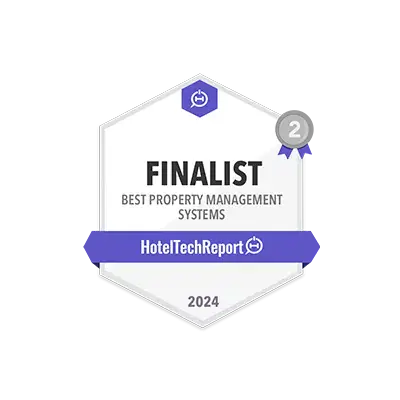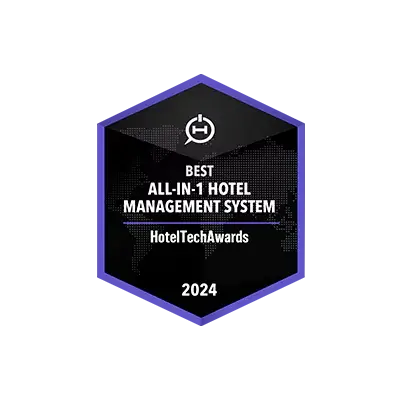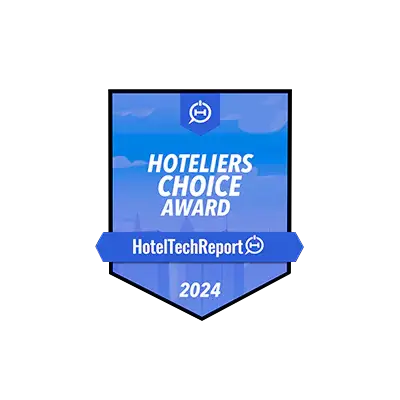Starting a lodging business
Full guide & resources
So you want to be a hotel owner? Now might be an opportune time.
Hotels proved their resiliency during the pandemic and have experienced remarkable growth in the years since. Today, lodging businesses are enjoying high occupancy rates and unprecedented pricing power. Moreover, certain hotel industry sectors, such as luxury resorts and select-service hotels, are achieving record profitability.
As other hotel proprietors may tell you, owning a hotel can be a rich and rewarding experience, but it’s also a lot of work, and there is a degree of risk involved.
Do you have what it takes to own and operate a successful hotel business? In this step-by-step guide, we’ll take you through how to launch a hotel business. You’ll hear from real-life hoteliers about their experiences and get advice from industry experts to help you avoid common pitfalls.
Why own a hotel? The benefits of owning a lodging business
Before anything, it’s a good idea to clarify your objectives. Why do you want to own a hotel? Is it because you want to host the rich and famous, design your dream spot, or get fabulously wealthy? Or do you have more charitable objectives in mind, like providing refuge for weary travelers or helping build your local community? For three-time property owners Kristy Espat and Victor Tofan, it kind of happened by accident.
As the owners of hotels in Peru, Germany, and Spain, Victor and Kristy come from families with experience in the industry. Victor says,

No matter how you come into hotel ownership, here are some of the benefits you can expect:
- Return on investment. A well-managed hotel can generate significant revenue for its owners. However, returns on investment (ROI) can vary broadly by property type and location. Hotel performance is also vulnerable to outside forces such as the economy’s health, travel disruptions, severe weather, or a pandemic.
- Property value. Hotel properties can appreciate in value over time, especially when situated in a prime location. As the property value increases, so does the potential return on investment if the owner decides to sell.
- Tax benefits. Depending on where the hotel is located, owners may be eligible for tax benefits such as allowances for capital expenditures, structures and buildings, annual investments, and capital gains relief.
- Social and networking opportunities. Owning a hotel presents all sorts of opportunities to meet and mingle with guests and clients from around the world, build a team of hospitality professionals, and partner with local businesses, forging lifelong relationships.
So, while your business idea may bring a lot of prestige and opportunity, it also comes with a lot of risk and responsibility.
5 common hotel business models
Hotels come in all shapes and sizes within the hospitality industry, with various types of business models. Here are some of the most common ones:
1) Independent hotels
An independent hotel is typically owner-operated rather than run by a hotel management company or affiliated with a hotel brand.
Who’s it for?
Independent hotels are a good fit for entrepreneurs with the know-how to run a hospitality business, want to be hands-on, and are looking for control over their brand identity and operating standards. However, independent hotels don’t enjoy the advantages of brand awareness and economies of scale offered by an affiliation with a large, well-known brand. They have to work extra hard to build awareness and guest loyalty.
Kristy and Victor are independent property owners and attribute the right technology to helping them manage everything on their own. Victor says,

2) Managed hotels
A managed hotel is operated by a third-party hotel management company. This may be a large conglomerate that manages tens or even hundreds of hotels under multiple brands, such as Marriott or Hilton, or a small company that operates a handful of regional properties.
Who’s it for?
Managed hotels are best for an owner who has limited hospitality experience and prefers to leave day-to-day hotel operations to seasoned professionals. Managed hotels benefit from brand awareness, economies of scale, and infrastructure offered by management companies and hotel brands, such as pre-set operational policies and procedures and access to sales & marketing networks. However, they must pay fees to the management company, typically in the form of a set monthly fee and a percentage of revenue from sales of rooms and other services.
3) Franchise hotels
Franchise hotels operate under a franchise agreement with hotel brands. The brand doesn’t manage the hotel, but the property is licensed to use its brand name and promote itself as part of the group.
Who’s it for?
Franchise hotels are particularly attractive to those who want to benefit from the advantages of being a part of a well-known hotel group, such as name recognition and access to the group’s infrastructure, while still gaining more flexibility in managing their own business. It can be an ideal solution for professionals who have knowledge and resources but lack marketing support or franchise experience.
4) Leased hotels
In the leased hotel model, the owner leases the property to an operator who assumes responsibility for managing the hotel. The operator pays the owner rent and may also share a portion of revenue or profits.
Who’s it for?
Leased hotels are a good fit for the absentee investor who prefers not to get involved in managing the property. They provide the owner with a passive income stream while transferring operational responsibilities to the operator.
5) Hotel partnerships and REITs
If you’re not ready to take on full ownership, other options include a partnership or a REIT. In a partnership, two or more owners share ownership and responsibilities, as well as risk, expenses, and revenue.
A REIT, or Real Estate Investment Trust, is a company that owns, operates, or finances income-generating real estate, including hotels. Investors pool their capital and spread their investment across a portfolio of properties, receiving shares in the company and income in the form of dividends.
Who’s it for?
Hotel partnerships and REIT’s are a good fit for someone who wants to diversify investments without actively participating in the management of properties.
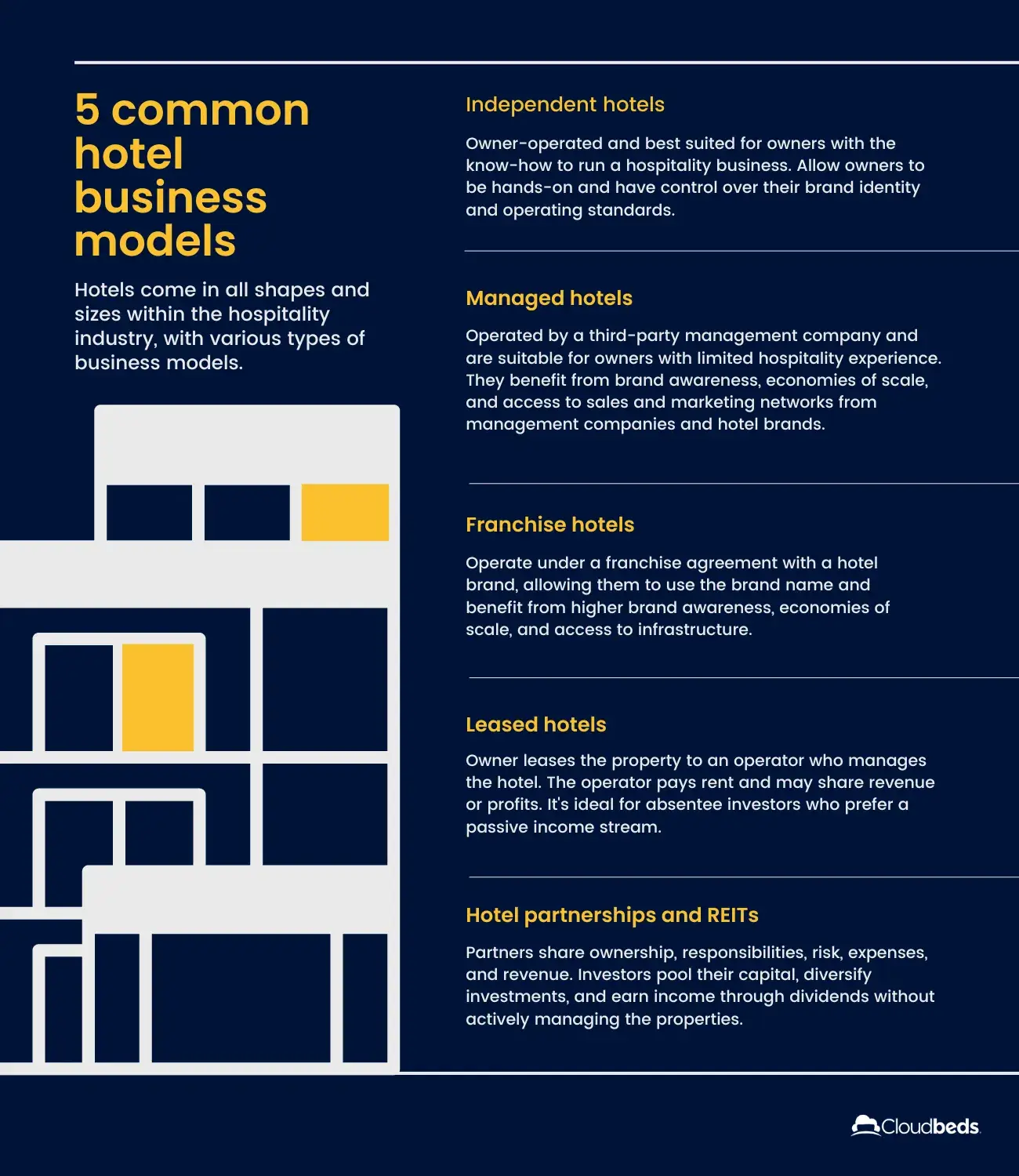
How to launch an independent hotel business: 10 key steps
Let’s assume you have decided to go the independent route for your new hotel business. You will oversee the property and intend to be very involved in management and operations. Now, how do you launch your own hotel business?
One of the first priorities of a start-up business is to define long-term goals. Do you intend to hold on to the property for life and pass it on to future generations? Or do you anticipate selling it in ten to 20 years? Would you like to build a portfolio of hotels or hospitality businesses?
While you don’t have to answer these questions right away, it’s a good idea to have a long-term game plan in mind as you go through the following 10 steps to launching an independent property.
1) Decide whether to build or buy
Deciding whether to design and construct a hotel from the ground up or purchase an existing hotel is an essential first step because it will help determine your path to ownership. Let’s review the pros and cons of each option.
Option 1: Building
If you decide to build a hotel, you can design the exact property you have in mind and maybe have always dreamed about – notwithstanding any building restrictions. But remember that building a hotel can be a long, drawn-out process. You will have to find an available location, negotiate a price for the land, work with an architect and interior designer, and get building permits, along with numerous other hoops to jump through. There is also the risk of cost overruns and delays in construction and acquiring permits.
How much money will you need? According to a 2021 study from HVS, the average costs per room, or “key,” of developing the main categories of hotels in the U.S. are estimated as follows.
- Limited-service hotel: $146,910
- Midscale extended stay hotel: $154,502
- Select-service hotel: $245,238
- Full-service hotel: $477,058
- Luxury hotel: $805,010
Generally, the higher the caliber of the property, the more money required to build it. The objective will be to recoup the costs by charging higher room rates, meals, and ancillary services.
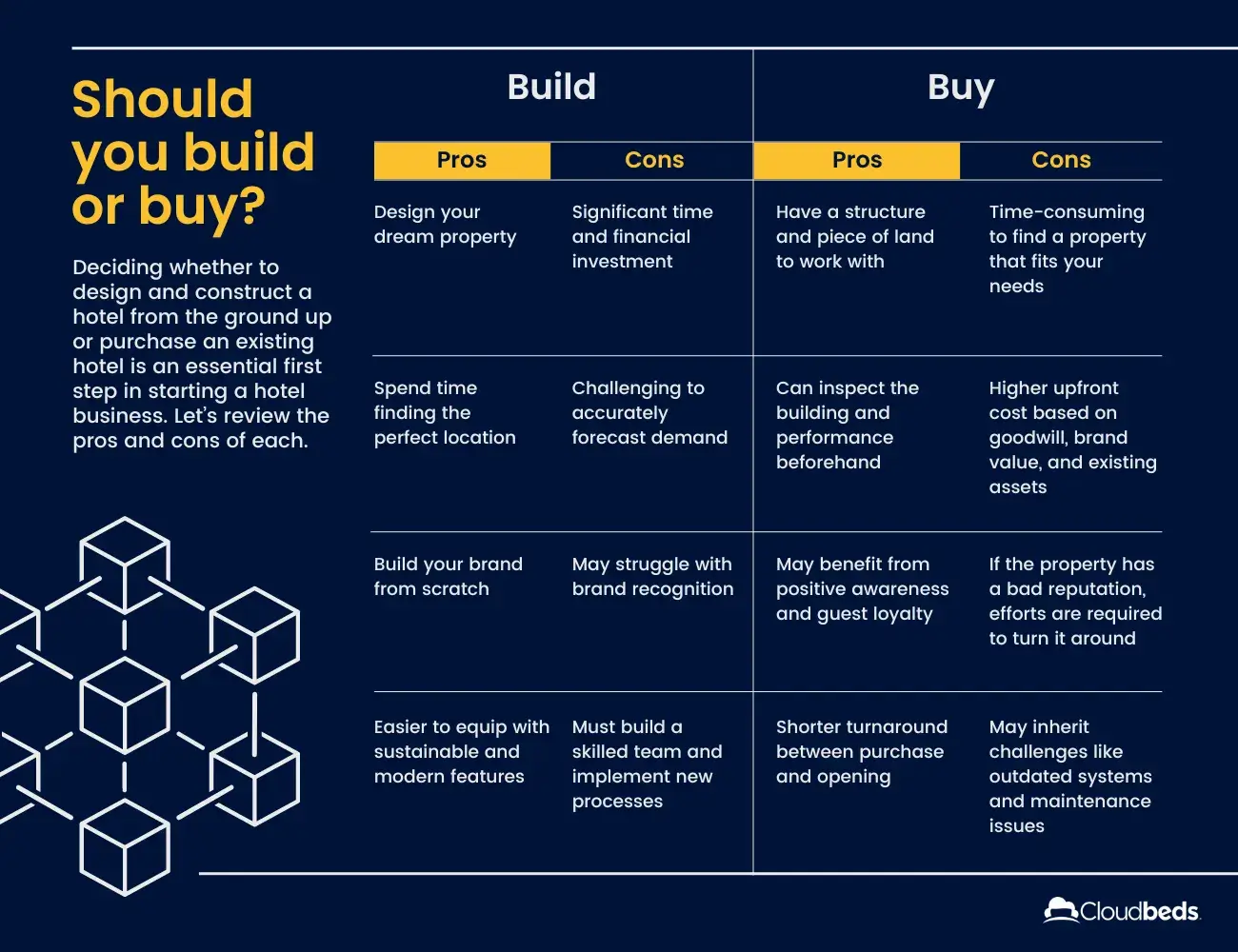
Option 2: Buying
If you choose to buy an existing property, you will have to find one that is for sale, well-located, the right property type, and affordable. And then, you may have to undergo property upgrades or renovations.
If the property is well-run and has a good reputation, you will benefit from positive awareness and built-in guest loyalty. However, if it has a bad reputation, you will need to strategically announce new ownership and quickly build a positive reputation.
Generally, purchasing an existing hotel involves less risk because you can inspect the building and review the property’s performance history. The turnaround time between purchase and the opening date should be much shorter, too, meaning you can start earning a return on your investment more quickly.
In summary, for first-time hotel owners, buying an existing property may be a safer route. Whether you’re building or purchasing, keep in mind that it’s all about location, location, location! Hotels close to a city center, convention center, beach, shopping center, attractions, and landmarks are a bigger draw for travelers than those in remote locations.
Marco Leibundgut, Founder of the Bogentrakt Hostel in Chur, Switzerland, fell somewhere in the middle of building and buying when he turned a former prison located in Chur’s historical city center into a hostel. He spent three years rebuilding and renovating, which was quite a challenge with the small prison cells. He likes to say that his team “brought freedom back into this former prison.”
2) Analyze the local market
Once you have chosen a location, you will want to analyze the local market. How strong is the demand for hotel rooms in the area? How are similar hotels performing? Are there seasonal ups and downs? And what kind of economic development is expected in the coming years?
With a clear picture of the local market, you can decide what kind of property is missing and is likely to perform well. Now you can:
- Choose the type of hotel. Will it be a luxury, midscale, economy, or extended-stay hotel? Will it be a boutique hotel, inn, bed and breakfast, guest house, hostel, apartment hotel, or a hybrid concept?
- Decide how big it will be. Will it be a large hotel or a small hotel? What number of rooms will it have? What facilities will you offer, such as a restaurant, bar, spa, pool, fitness room, concierge, golf, function space, etc.?
- Choose the concept or niche. Will it have a theme? How will the design and ambiance be? What unique features or experiences will attract travelers? Will you offer a unique concept like coliving, net zero, or hybrid hospitality?
Now more than ever, a hotel’s uniqueness really matters. Cloudbeds’ Lodging Report found a shift towards experience-driven travel, with travelers prioritizing properties that focus on enhancing the guest experience and satisfying travelers’ social, environmental, and economic needs.
- Zero Box Lodge in Coimbra, Portugal, offers capsule-style rooms designed as minimalist wooden boxes in a shared dorm with a private bathroom.
- At Matices Hotel de Barracas in Tequila, Mexico, guests stay in barrel-shaped tequila rooms surrounded by an agave field.
- At The Pad in Colorado, USA, in the heart of the Rocky Mountains, guests can choose from micro rooms, shared dorms, or private group rooms.
3) Commission a hotel feasibility study
Once you have conducted your own market analysis, it’s time to hand things over to a professional real estate appraiser to conduct a feasibility study. A feasibility study is an analysis of a hotel building project to determine its potential as a sustainable and viable financial investment.
Typically, a feasibility study analyzes the property’s location, the market, demographics, and economic conditions, including site size, visibility, access, construction regulations, and competitive landscape. It also estimates costs, revenue, and returns on investment for the intended holding period.
Generally, a project is determined to be feasible if its projected economic value is estimated to be greater than its costs, generating the required ROI. If the project is not feasible, pursuing it may not be recommended. In either case, if the purchaser wishes to move forward with the project, the lender, bank, and business partners (if applicable) will request to review the feasibility study or may conduct one on their own.
4) Create your hotel business plan
Whether you’re purchasing or building a hotel, get ready for paperwork. Here are a few of the documents you’ll need to prepare.
- Business plan. A hotel business plan identifies the hotel’s goals, objectives, business needs, and strategies for success. It includes an executive summary with details of the business concept, market research, investments required, and a roadmap for building and operating the business. This is an essential document for obtaining financing from potential investors.
- Operational plan. The operational plan outlines the strategies, procedures, and guidelines for managing the hotel successfully. It includes the operational structure, staffing, seasonal patterns, service standards, commercial strategies, food & beverage operations, property maintenance, financial management, and quality assurance, among other details.
- Financial plan. This document outlines the hotel’s investment requirements, funding sources, financial goals, projections, and strategies for achieving the projections. It includes details about projected startup costs, operating costs, revenue, cash flow, and profitability, providing a roadmap for financial performance. It contains metrics like expected occupancy rate, average daily rate (ADR), and revenue per available room (RevPAR).
- Marketing plan. This document outlines planned marketing strategies, including branding, positioning, key value propositions, target markets (leisure vs. business travelers), and competitive landscape (SWOT analysis). It outlines strategies for pricing and promotions, marketing assets like photography, videos, and collateral, and planned activities on marketing channels, including the hotel website, paid media, online travel agencies (OTAs), public relations, social media, and online review sites. See sample hotel marketing plan templates here.
In an episode of The Turndown, Asa Firestone, CEO and Co-Founder of A-Lodge, an adventure lodging company in Colorado, says his biggest piece of advice for new hoteliers is

5) Complete the paperwork: registrations, permits, and licenses
But wait, there’s more paperwork. As a new hotel owner, you must submit a host of applications for permits and licenses. These may vary by region and property type but typically include business registration and license forms, trademark applications, operations permits, tax registration forms, health and safety compliance forms, insurance coverage, and employment documentation.
6) Source hotel equipment, decor, and suppliers
Next, you’ll need to decide how to furnish your property, referred to in finance as FF&E: furnishings, fixtures, and equipment. This will require deciding how to appoint guestrooms, public areas, and back-of-house areas like the kitchen, administrative offices, and staff communal areas.
Will you purchase everything new, have it custom-built, or source second-hand? If you’re taking over an existing hotel, many of these items might already be in place but may need to be refurbished or replaced. To purchase FF&E, you will need to set up relationships and accounts with suppliers and establish credit. Choose wisely, as good suppliers can help you save costs and assure quality and expediency for years to come.
When refurbishing Bogentrakt, Marco decided to leave some of the original details from the prison, including the doors and a few bars but to make it more comfortable “utilized local carpenters to make the beds and hired a local street artist to paint murals throughout the property.” As part of his sustainability efforts, Marco wanted to keep his furnishings as local as possible and decided upfront that they would not utilize single-use plastics in their shampoos and soaps.
7) Hire the right hospitality team
As you approach the opening date, you will need to start building your operating team. Typically, the higher the position is on the organizational chart, the further out you will need to hire them. This begins with your management team, such as the hotel manager, financial controller, human resources manager, director of sales and marketing, revenue manager, chef, and restaurant manager. Kristy says that for managerial positions, “they try to find people with mid-level experience who are eager to learn and grow with the property.”
Closer to the opening date, you will need to hire and train hotel staff for the front desk, guest services, housekeeping, kitchen, banquets, administration, and other departments on the property.
New business owners should be aware of the current staffing shortages in the industry. In an October 2022 poll from the American Hotel & Lodging Association (AHLA), 87% of respondents indicated they were experiencing a staffing shortage, 36% severely so. Therefore, ensure that you’re allowing more time to hire, have a retention strategy, and are thinking of ways to utilize technology to reduce the strain on staff. Victor says something that works for them has been implementing a bonus structure where if the business does well, their general managers receive a share as an incentive to keep staff engaged in the business.
Marco has taken a unique approach to hiring and compensation at Bogentrakt by paying all his employees the same wage, regardless of their role. He says,

Marco also cross-trains employees so that a housekeeper, for example, can hop on the system and check a guest in if the front desk agent happens to be on break.
8) Choose the right hotel technology
Technology forms the foundation of a highly efficient hotel, so making the right investment decisions is critical. In addition to keeping the lights on, the kitchen operating smoothly, and guests connected to wifi and entertainment, you will need software to streamline and automate operations, sales & marketing, revenue management, and food & beverage functions. William Lake, Co-Founder of Olive & Lake, a Hotel Consultation & Digital Marketing Agency, recommends to sell rooms effectively online,

To reduce technology costs and centralize operations, more hotels are shifting to a cloud-based, integrated hospitality platform model that consolidates all core software under one technology provider and allows additional software to be connected via API (application programming interface). By housing hardware, software, and data off-premise, a cloud-based system saves hotel owners from paying expensive upfront technology costs and helps provide guests with a seamless experience.
As a new hotelier, you have the advantage of choosing leading technology off the bat, giving your property the best shot at success and room to grow and evolve over time without having to switch solutions. Sebastien Olive, Co-Founder of Olive & Lake, says that “it’s often difficult for new hoteliers to know what solution is best for them; we always advise clients to find something which will help them save time, improve the guest experience, and increase revenue.”
9) Activate marketing & distribution channels
As your opening date nears the typical traveler booking window, you will want to ramp up marketing and distribution activities. Kristy says, “you need visibility anywhere that a traveler may be searching – on organic and paid channels.” This includes:
- Listing on various OTAs. Listing on big OTAs like Booking.com and Expedia, as well as on smaller, regional, and specialty OTAs such as Airbnb, Hostelworld, or Despegar. Marco has attracted a wide range of guests thanks to being active on multiple channels. He says, “we can set up all different promotions through these channels to attract a really good mix of guests.”
- Ensuring your hotel website is set up and ready to take reservations via your booking engine. William from Olive & Lake stresses the importance of a website for new hotels saying that “a professionally designed website is vital as it serves as a platform for commission-free direct bookings, increases profitability, and helps to enhance brand identity.”
- Creating a Google Business Profile, a listing on Tripadvisor, and listings on other applicable review sites and online directories.
- Launching a digital marketing strategy such as advertising on Google Ads, metasearch engines, or Facebook and Instagram.
- Building an email database of prospective guest segments and an email marketing strategy to inform them of the opening date and other news.
- Working with a PR agency, local tourism partners, and your local destination marketing organization (DMO) to help spread the word.
Kristy and Victor urge new hoteliers to consider working with a digital marketing agency or service. Victor says,

- The Big Book of OTAs. A guide for hoteliers to top distribution channels, including a recipe for the ideal channel mix, a list of top-performing OTAs in your region, and a directory of over 75 OTAs.
- More Reservations, Happier Guests. The ultimate guide for the modern hotelier, a deep dive into the fundamentals of running a successful lodging business, from technology to guest service to data analytics.
10) Prepare for the grand opening
At last, the big day is about to arrive! Hotel openings are notoriously hectic and full of surprises, so you will want to be uber-organized and level-headed. A pre-opening checklist and frequent meetings and check-ins with your team will help ensure everything is done on time.
How will you acknowledge the opening? Quietly, or by throwing a lavish opening party? An event can be a great way to create excitement and build word-of-mouth, especially if you invite media, an official photographer, local businesses, travel agents, tourism partners, and social media influencers – all the people who can help spread the word and get heads into beds. But it’s a good idea to wait a few weeks to throw a party to ensure the hotel is fully operational, staff are well trained, and any wrinkles have been ironed out.










